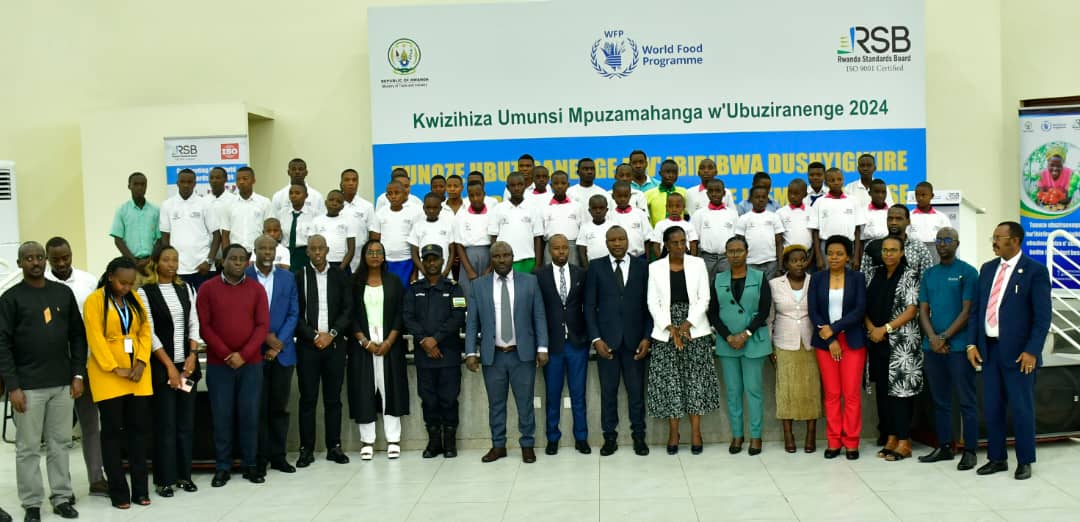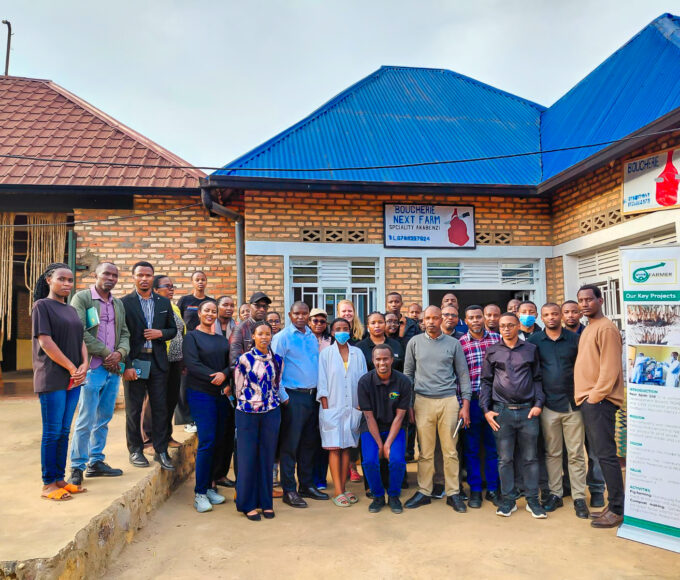Ensuring Food Safety in Schools: Addressing the Dangers of Improper Cooking Practices

On November 29, 2024, the Rwanda Standards Board (RSB) hosted an important event at the National Ubutore Development Center in Nkumba, Burera District, to celebrate World Standards Day. This year’s theme, “Role of Standards in Quality Education Through Improving Food Safety in School Feeding Programme Supply Chain,” highlighted the recently published standards on Foods for Special Dietary Use. These standards are designed to guide stakeholders in the food value chain toward achieving safety and quality in food preparation.
During the event, school institutions received a critical warning about the hazardous practice of using gasoline, kerosene, or paraffin in food preparation. This alarming trend, which some schools have adopted in an attempt to prevent food poisoning, raises significant health concerns and is now under scrutiny by the RSB.
Mr. Murenzi Raymond, DG of the RSB, emphasized the illegality and dangers of these practices. “Gasoline and similar substances are not intended for food preparation,” he stated firmly. “Using such products not only fails to protect children from diseases but can also increase their health risks.” This misuse of combustible petroleum products is a violation of food safety regulations and a misguided attempt to ensure meal safety.

The RSB’s campaign aims to boost food safety in school feeding programs and will kick off in eleven selected districts. This initiative includes a nationwide awareness campaign targeting all stakeholders involved in the school feeding program to explain the role of standards in promoting food safety and ensuring the supply of safe food to students. The campaign will also provide technical assistance to farmers, manufacturers, post-harvest handling agents, warehousing, transport, distribution actors, and schools. The goal is to help these stakeholders comply with food safety and quality standards in the school feeding program supply chain. By establishing linkages among actors, the initiative aims to ensure that locally produced foods are safe, nutritious, and healthy, ultimately leading to improved student performance.
Governor Maurice Mugabowagahunde of the Northern Province highlighted the necessity of this campaign, addressing the ongoing issue of substandard meals served in schools. “This program supports the ‘Dusangire Lunch’ initiative, aimed at providing nutritious meals to students and preventing school dropouts,” he explained. The governor noted that the campaign seeks to ensure children receive quality meals that promote their health and learning.

The RSB’s efforts will extend beyond food preparation; they will also inspect storage practices at schools. “We need to ensure that food is stored properly to prevent any potential health risks,” Mugabowagahunde stated. The goal is to eliminate instances of food poisoning and ensure that all children have access to safe, nutritious meals. He emphasized that maintaining the integrity of the food supply chain is essential, from harvest to the child’s plate.
During the World Standards Day celebrations, awards were presented to private companies committed to maintaining high-quality standards in their products.
Dr. Sina Gérard of Urwibutso Entreprises, a recipient of the EAC Quality Awards 2024, attributed his success to a strong focus on quality. “The secret is to work diligently and respect quality in everything we do,” he said, emphasizing the importance of integrity in production processes. Gérard’s commitment to quality not only benefits his business but also contributes to the overall health and well-being of consumers.

Grace Mbanza of Zima Health Group Ltd, another award winner, expressed pride in their product, Extravargin pumpkin oil, which is beneficial for health. “We aim to support the national quality agenda in schools with our healthy products,” she said, highlighting the importance of quality food for children’s cognitive and physical development. Nutritious meals significantly impact a child’s ability to learn and thrive in an academic environment.

The RSB’s campaign aims to educate stakeholders on quality food regulations and best practices. “We want to ensure that everyone understands the importance of food safety and compliance with quality standards,” Murenzi reiterated. This educational effort will involve collaboration with local authorities, school officials, and food suppliers to create a comprehensive approach to food safety.
As the initiative unfolds, the hope is that schools will adopt safer cooking practices, ensuring that children receive not only adequate nutrition but also meals that promote their overall well-being. Murenzi emphasized that quality is not merely a guideline but a necessity for the health of future generations. “Failure to meet quality standards can lead to serious consequences, including foodborne illnesses that can affect children’s health and education,” he warned.
The RSB plans to conduct regular inspections of food storage facilities and kitchens in schools to ensure compliance with safety regulations.

“Our inspectors visit schools at least twice a week to monitor food safety practices and provide guidance where necessary,” Governor Mugabowagahunde stated. This proactive approach aims to prevent any lapses in food safety and ensure that children are protected from potential health risks associated with poor food handling and storage.
Collaboration between the RSB, local authorities, and educational institutions is crucial in fostering a culture of food safety and quality. By working together, these entities can create an environment where children are not only fed but are fed well. The emphasis on quality food aligns with broader public health goals and the commitment to improving the overall health of the population.
The celebration of World Standards Day served as a vital reminder of the importance of food safety in schools. The alarming practice of using inappropriate substances in food preparation must be urgently addressed to protect the health of children. Through education, inspection, and collaboration, the RSB and local authorities aim to ensure that every child receives safe, nutritious meals that contribute positively to their growth and learning. By prioritizing food quality and safety, we can work towards a healthier future for our children and society as a whole.


Related Articles
The SFERE Clean Cooking Awareness Campaign: Advancing Solutions Through Community Engagement
Progress in clean cooking is happening one step at a time through...
Strengthening Rwanda’s SMEs for Circular Food Systems: Embedding Circularity Beyond Project Implementation for Long-Term Transformation
As Rwanda advances its circular economy ambitions, small and medium-sized enterprises (SMEs)...
Powering Food, Restoring Land: How Renewable Energy and Regenerative Agriculture Are Transforming Rwanda’s Farms
Across Rwanda’s rolling hills, a quiet revolution is underway. It begins in...
Late February Weather Alert: Heavy and Above-Average Rainfall Forecast Across Rwanda
The Ministry in charge of Disaster Management (MINEMA) has issued a weather...













Leave a comment